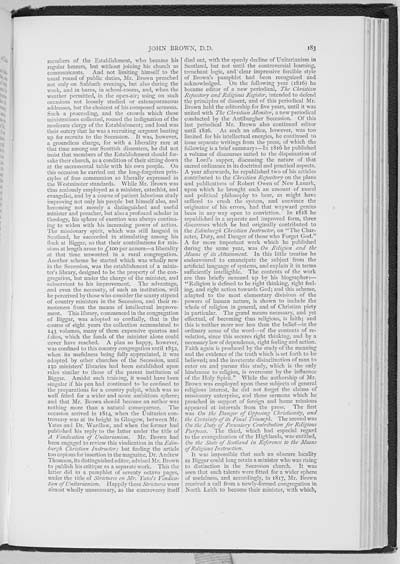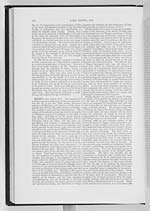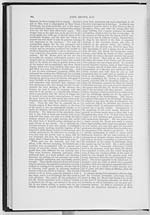183
members of the Establishment, who became his
regular hearers, but without joining his church as
communicants. And not limiting himself to the
usual round of public duties, Mr. Brown preached
not only on Sabbath evenings, but also during the
week, and in barns, in school-rooms, and, when the
weather permitted, in the open-air; using on such
occasions not loosely studied or extemporaneous
addresses, but the choicest of his composed sermons.
Such a proceeding, and the crowds which these
ministrations collected, roused the indignation of the
moderate clergy of the Establishment; and loud was
their outcry that he was a recruiting sergeant beating
up for recruits to the Secession. It was, however,
a groundless charge, for with a liberality rare at
that time among our Scottish dissenters, he did not
insist that members of the Establishment should for-
sake their church, as a condition of their sitting down
at the sacramental table with his own people. On
this occasion he carried out the long-forgotten prin-
ciples of free communion so liberally expressed in
the Westminster standards. While Mr. Brown was
thus zealously employed as a minister, catechist, and
evangelist, and by a course of patient laborious study
improving not only his people but himself also, and
becoming not merely a distinguished and useful
minister and preacher, but also a profound scholar in
theology, his sphere of exertion was always continu-
ing to widen with his increasing power of action.
The missionary spirit, which was still languid in
Scotland, he succeeded in stimulating among his
flock at Biggar, so that their contributions for mis-
sions at length arose to �100 per annum�a liberality
at that time unwonted in a rural congregation.
Another scheme he started which was wholly new
in the Secession, was the establishment of a minis-
ter's library, designed to be the property of the con-
gregation, but under the charge of the minister, and
subservient to his improvement. The advantage,
and even the necessity, of such an institution, will
be perceived by those who consider the scanty stipend
of country ministers in the Secession, and their re-
moteness from the means of intellectual improve-
ment. This library, commenced in the congregation
of Biggar, was adopted so cordially, that in the
course of eight years the collection accumulated to
143 volumes, many of them expensive quartos and
folios, which the funds of the minister alone could
never have reached. A plan so happy, however,
was confined to this country congregation until 1852,
when its usefulness being fully appreciated, it was
adopted by other churches of the Secession, until
150 ministers' libraries had been established upon
rules similar to those of the parent institution of
Biggar. Amidst such training, it would have been
singular if his pen had continued to be confined to
the preparations for a country pulpit, which was so
well fitted for a wider and more ambitious sphere;
and that Mr. Brown should become an author was
nothing more than a natural consequence. The
occasion arrived in 1814, when the Unitarian con-
troversy was at its height in Glasgow, between Mr.
Yates and Dr. Wardlaw, and when the former had
published his reply to the latter under the title of
A Vindication of Unitarianism. Mr. Brown had
been engaged to review this vindication in the Edin-
burgh Christian Instructor; but finding the article
too copious for insertion in the magazine, Dr. Andrew
Thomson, its distinguished editor, advised Mr. Brown
to publish his critique as a separate work. This the
latter did in a pamphlet of seventy octavo pages,
under the title of Strictures on Mr. Yates's Vindica-
tion of Unitarianism. Happily these Strictures were
almost wholly unnecessary, as the controversy itself
died out, with 'the speedy decline of Unitarianism in
Scotland, but not until the controversial learning,
trenchant logic, and clear impressive forcible style
of Brown's pamphlet had been recognized and
acknowledged. On the following year (1816) he
became editor of a new periodical, The Christian
Repository and Religious Register, intended to defend
the principles of dissent, and of this periodical Mr.
Brown held the editorship for five years, until it was
united with The Christian Monitor, a new periodical
conducted by the Antiburgher Secession. Of this
last periodical Mr. Brown also continued editor
until 1826. As such an office, however, was too
limited for his intellectual energies, he continued to
issue separate writings from the press, of which the
following is a brief summary:�In 1816 he published
a volume of discourses suited to the dispensation of
the Lord's supper, discussing the nature of that
sacred ordinance in its doctrinal and practical aspects.
A year afterwards, he republished two of his articles
contributed to the Christian Repository on the plans
and publications of Robert Owen of New Lanark,
upon which he brought such an amount of moral
and political philosophy to bear, as might have
sufficed to crush the system, and convince the
originator of his errors, had that wayward genius
been in any way open to conviction. In 1818 he
republished in a separate and improved form, three
discourses which he had originally contributed to
the Edinburgh Christian Instructor, on "The Char-
acter, Duty, and Danger of those who Forget God."
A far more important work which he published
during the same year, was On Religion and the
Means of its Attainment. In this little treatise he
endeavoured to emancipate the subject from the
artificial language of systems, and explain it in terms
sufficiently intelligible. The contents of the work
are thus briefly summed up by his biographer:�
"Religion is defined to be right thinking, right feel-
ing, and right action towards God; and this scheme,
adapted to the most elementary divisions of the
powers of human nature, is shown to include the
whole of religion in general, and of Christian piety
in particular. The grand means necessary, and yet
effectual, of becoming thus religious, is faith; and
this is neither more nor less than the belief�in the
ordinary sense of the word�of the contents of re-
velation, since this secures right thinking, and by a
necessary law of dependence, right feeling and action.
Faith again is produced by the study of the meaning
and the evidence of the truth which is set forth to be
believed; and the inveterate disinclination of man to
enter on and pursue this study, which is the only
hindrance to religion, is overcome by the influence
of the Holy Spirit." While the authorship of Mr.
Brown was employed upon these subjects of general
religious interest, he did not forget the claims of
missionary enterprise, and these sermons which he
preached in support of foreign and home missions
appeared at intervals from the press. The first
was On the Danger of Opposing Christianity, and
the Certainty of its Final Triumph. The second was
On the Duty of Pecuniary Contribution for Religious
Purposes. The third, which had especial regard
to the evangelization of the Highlands, was entitled,
On the State of Scotland in Reference to the Means
of Religious Instruction.
It was impossible that such an obscure locality
as Biggar could long retain a minister who was rising
to distinction in the Secession church. It was
seen that such talents were fitted for a wider sphere
of usefulness, and accordingly, in 1817, Mr. Brown
received a call from a newly-formed congregation in
North Leith to become their minister, with which,

![]() Universal Viewer |
Universal Viewer | ![]() Mirador |
Large image | Transcription
Mirador |
Large image | Transcription
![]()

